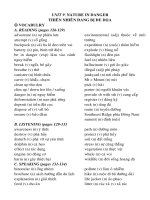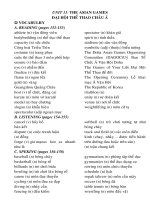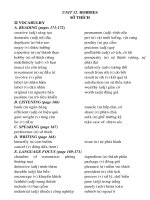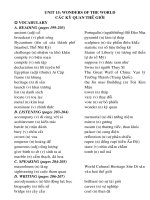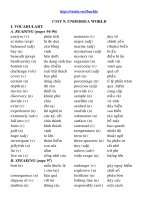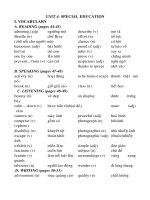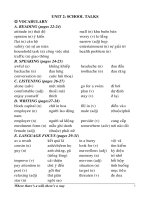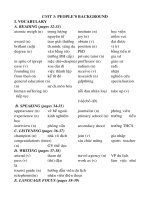BT unit 13-14-class10
Bạn đang xem bản rút gọn của tài liệu. Xem và tải ngay bản đầy đủ của tài liệu tại đây (118.72 KB, 2 trang )
UNIT 13-14
I. Adjective of attitude < Tính từ chỉ thái độ >:
Tính từ chỉ thái độ -ed/ -ing ( một số động từ khi thêm Ing/ ed có thể dùng như tính từ)
-Tính từ tận cùng -ing: mang tính chủ động, chỉ tính chất gắn liền với người hoặc vật, sự việc, tính chất có
thể tác động lên đối tượng khác.
- Tính từ tận cùng -ed: mang tính bị động, chỉ cảm giác ( thường là của người) do bị đối tượng khác tác
động.
Ex: I am interested in the film > The film made me interested.
Ex: I find the film very interesting > The film is very interesting > It is an interesting film.
1. She was (disappoint) ………………………in the movie. She had expected it to be better.
2. Are you (interest)………………… in that movie? – Yes, it is really(interest)………………
3. The football match made us (excite)……………………
4. It’s sometimes ( embarrass) …………….when you have to ask people for money.
5. I found the film ( terrify)……………. Afterwards everybody was (shock)……….
6. I had never expected to get the job. I was ( amaze) …………when it was offered to me.
7. Why do you always look so( bore)………….? Is your life really so (bore)………….
8. She felt ( please) …………… to hear that her son got the scholarship.
9 .I thought the program on was (fascinate). ……I was absolutely (fascinate)……………………
10. The thunder made the children ( scare)…………………
II. Put in a/ an / the where necessary. :
1. a/ an: được dùng trước một danh từ số ít đếm được, chúng có nghĩa là một, chúng được dùng trong câu
có tính khái quát hoặc khi chủ thể được đề cập LẦN ĐẦU TIÊN. “AN” đứng trước nguyên âm (a, o, e, u, i)
e.g: A ball is round. ( Nghĩa chung, khái quát, chỉ tất cả các quả bóng)
e.g: I saw a boy on the street. ( chúng ta không biết cậu bé nào, chưa được đề cập đến trước đó)
2. the: Khi danh từ đó được nhắc đến kể từ LẦN THỨ HAI, hoặc được xác định qua ngữ cảnh ( được xác
định cụ thể về mặt tính chất, đặc điểm, vị trí), hoặc về một khái niệm phổ thông. mọtt thứ duy nhất tồn tại ai
cũng biết
Ex: - I have a pencil and an eraser. The pencil costs 3,500 VND and the eraser is 2,000 VND.
- The boy in the corner is my friend. ( Cả người nghe và người nói đều biết đó là cậu bé nào)
- The earth is round. ( Chỉ có một trái đất ai cũng biết).
3. Với danh từ không đếm được, dùng the khi nói đến vật cụ thể, không dùng the khi nói chung
e.g: Sugar is sweet.
The sugar on the table is from Cuba.
4. Với danh từ đếm được số nhiều, khi chúng mang nghĩa đại diện chung thì không dùng the:
e.g: Oranges are green until they are ripe.
5. The: Dùng trước những tính từ so sánh bậc nhất hoặc trước cụm danh từ có only, f irst, last:( e.g: the last
thing, the first person, the only way, the best car.)
Fill in the blanks with a, an, the or ø (zero article)
1. Mandela was born in ………….South Africa
2. Is there ……… public telephone near here ?
3. My father often has ……… sandwich for …………… lunch
4. He drinks …………cup of coffee …………breakfast
5. ………fishes live in ……… water
6. ……….sun rises in …………East
7. It was ……….long flight , but finally we arrived in ……… Paris
8. Dr John is ………… most insufferable person I know
9. What ………….expensive shirt !
10. There are ………… egg and ………… tomato on ……… table.
11. Jason’s father bought him____________bike that he wanted for his birthday
12. ____________ Statue of Liberty was a gift of friendship from___________ France to______________ United
states.
13. Rita is studying___________ English and___________ Math this semester.
14. __________ judge asked___________ witness to tell____________ truth.
15. Please give me__________ cup of___________ coffee with ___________ cream and___________ sugar.
16. __________ big books on___________ table are for my history class.
17. My____________ car is four years old, and it still runs well.
18. There are only___________ few seats for_____________ tonight’s musical.
19. ______________ chair that you are sitting in is broken.
20. _____________ Civil War was fought in ____________ United States between 1861 and 1865.
III. will vs. be going to :
1. be going to: diễn tả một dự định.
Ex: A: Why are you turning on the TV? -B: I’m going to watch the news.
2. Will : diễn tả một quyết định đưa ra vào lúc nói; một phỏng đoán, một đề nghị.
Ex: A: I want to buy this book but I don’t have enough money. -B: I’ll lend you some.
Ex: You are working very hard. I am sure you will pass this exam easily.
Ex: A: It’s very cold. -B: I’ll close the windows.
Complete the sentences with be going to or will + one of these verbs:
be (2), come, get, like(2), play, meet, pass, travel, walk, buy .
1. I ______________with Tim in the park tonight .He asked to be there at 7.00
2. Don't worry about your exam. I'm sure you _______________.
3. Why don't you try on this dress? It, _______________ nice on you.
4. You must meet George sometime. I think you _______________ him.
5. It's raining. Don't go out. You _______________ wet.
6. They've invited me to their house. They _______________ offended if I don't go.
7. He bought two rackets . He ____________tennis tomorrow
8. I've invited Sue to the party but I don't think she _______________.
9. – What _____________you_________ Jean for her birthday
I ________________her a book about wild life I think she ___________it.
10. They have some days off. They ____________________to DaLat.
IV. . It was not until…… that ……:
It was not until + time…… that + clause (S + V2/ed)……
Ex: The cinema did not become an industry until 1915.
It was not until 1915 that the cinema became an industry.
1. We did not study English until we began lower secondary school.
It was not until ……………………………………………………………………………………………….
2. He didn't stop drinking until he got part of his stomach removed
…………………………………………………………………………………………………
3. We couldn't make him change his mind until his teacher talked to him.
………………………………………………………………………………………………….
4. Tom didn't go to bed until he could solve the math problems.
………………………………………………………………………………………………
5. No one could leave the cinema until the film finished.
……………………………………………………………………………………………….
6. They didn’t return their home land until the war ended
………………………………………………………………………………
7. I couldn’t cook until I was 18 years old.
……………………………………………………………………………………
8. He didn’t come back home until his father called.
………………………………………………………………………………
